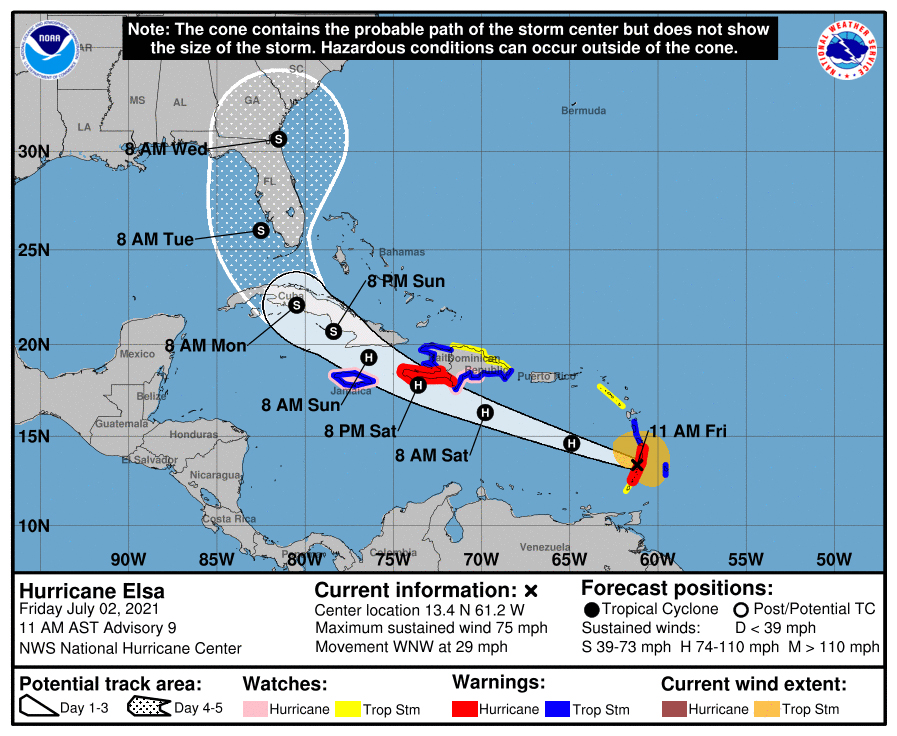Hurricane Elsa, 1st of season, could hit Florida next week
Elsa could affect Surfside, where the deadly condo collapsed.

The first hurricane of the 2021 season, named Elsa, formed Friday morning (July 2), and is on track to impact islands in the Caribbean Sea and possibly Florida, according to the National Hurricane Center (NHC).
Elsa — currently a Category 1 hurricane, with wind speeds between 74 and 95 mph (119 and 153 km/h) — is the earliest fifth named Atlantic storm on record, CNN reported. The four names on the 2021 list ahead of Elsa (Ana, Bill, Claudette and Danny) were given to tropical storms that didn't reach high enough wind speeds to qualify as hurricanes.
With such an early start, it's possible that the 2021 hurricane season may rival that of 2020, which set a record with 30 named storms, beating the previous record holder of 28 storms named in 2005, according to the National Oceanic and Atmospheric Administration (NOAA). Of those 30 named storms of 2020, 11 made landfall in the United States.
Related: Hurricane season: How long it lasts and what to expect
If Hurricane Elsa reaches Florida next week, it could impact the part of the coast where the deadly Surfside condo collapsed, CNN reported.
"It is possible that this area could see tropical storm-force winds," Florida Gov. Ron DeSantis said Friday, according to CNN. "Not guaranteed, but it is possible, and so our Department of Emergency Management is assuming that that will happen and making the necessary preparations to be able, obviously, to protect a lot of the equipment."
The "birth" of a hurricane requires two things: a weather disturbance, such as a thunderstorm, that pulls in warm surface air, and surface water that is at least 80 degrees Fahrenheit (27 degrees Celsius), according to NOAA. Such storms usually begin over the tropical ocean, where the seawater is hot enough and Earth's rotation helps them spin. However, Elsa got its start farther east than only one other storm on record — a 1933 storm, Brian McNoldy, a tropical weather expert at the University of Miami, posted on Twitter, according to The Washington Post.
Breaking space news, the latest updates on rocket launches, skywatching events and more!
"This is truly bizarre (and 1933 was among the most active seasons ever)," McNoldy wrote in the tweet. Typically, storms form in the Caribbean and Gulf of Mexico, instead of east of the Lesser Antilles, as Elsa did, The Washington Post reported.
#Elsa just became a tropical storm at 48.8°W, making it the second named storm to ever form so early in the season east of 50°W. First place goes to a storm in 1933 that became a TS on June 25 at 45.2°W. This is truly bizarre (and 1933 was among the most active seasons ever)... pic.twitter.com/ggsK93bLgKJuly 1, 2021
What do predictions find?
Hurricane-level winds are expected to reach Windward Islands (Grenada, St. Vincent and the Grenadines, St. Lucia and Dominica) on Friday, and Haiti on Saturday (July 4), the NHC reported in a statement. It's possible that hurricane conditions will affect the southern coast of the Dominican Republic and Jamaica on Saturday.
Meanwhile, heavy rainfall from Hurricane Elsa is forecast to hit the Windward Islands and southern Leeward Islands, including Barbados, on Friday. Puerto Rico, southern Hispaniola and Jamaica will also see rain this weekend, with possible flooding and mudslides, the NHC said. Strong winds, storm surges and rainfall are expected to impact parts of Cuba and possibly the Turks and Caicos, and the Bahamas this weekend.
Early next week, the Florida Keys and possibly the Florida Peninsula may experience a storm surge, wind and rainfall. "However, the forecast uncertainty remains larger than usual due to Elsa's potential interaction with the Greater Antilles this weekend," so it's unclear at this point how Elsa will progress, and whether it will impact Florida and/or the Gulf Coast, the NHC said in the statement.
The Atlantic hurricane season lasts from June 1 to Nov. 30. According to 2020 research published in the journal Proceedings of the National Academy of Sciences, hurricanes are getting stronger as the world warms due to climate change.
Originally published on Live Science.

Laura is an editor at Live Science. She edits Life's Little Mysteries and reports on general science, including archaeology and animals. Her work has appeared in The New York Times, Scholastic, Popular Science and Spectrum, a site on autism research. She has won multiple awards from the Society of Professional Journalists and the Washington Newspaper Publishers Association for her reporting at a weekly newspaper near Seattle. Laura holds a bachelor's degree in English literature and psychology from Washington University in St. Louis and an advanced certificate in science writing from NYU.


